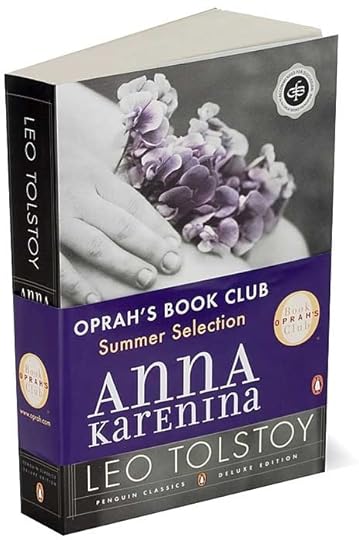Tolstoy’s paragraphs of the week
![[Leo Tolstoy.]](https://i.gr-assets.com/images/S/compressed.photo.goodreads.com/hostedimages/1387792103i/7672122.jpg)
[Leo Tolstoy.]
All happy families are alike; each unhappy family is unhappy in its own way.
All was confusion in the Oblonskys’ house. The wife had found out that the husband was having an affair with their former French governess, and had announced to the husband that she could not live in the same house with him. This situation had continued for three days now, and was painfully felt by the couple themselves, as well as by all members of the family and household. They felt that there was no sense in their living together and that people who meet accidentally at any inn have more connection with each other than they, the members of the family and household of the Oblonskys. The wife would not leave her rooms, the husband was away for the third day. The children were running all over the house as if lost; the English governess quarreled with the housekeeper and wrote a note to a friend, asking her to find her a new place; the cook had already left the premises the day before, at dinner-time; the kitchen-maid and coachman had given notice.
—Leo Tolstoy, Anna Karenina
You have to wonder about when, in his writing process, Tolstoy came up with his killer first line, seemingly one of the truest and certainly one of the most famous in all of literature. Did it always launch his 800-page novel, published when Tolstoy was 49, or did it arise during composition and end up placed there? (Scholars?) In any case, does it not refute the maddening “kill your darlings” commandment? It places an expository moralizing signpost atop a great paragraph that could open the book. There’s every nasty neat reason to cut it—and one not to, bound up in the category called genius.
I’m struck too by how Tolstoy starts in long-distance mode, referring to “the wife” and “the husband,” but in the third paragraph he’s moving the camera closer; soon we’re right up in their nostrils. I’ve always loved Tolstoy’s simple but elegant sentences, on full display here.
But of course I’m reading him in translation, in the new edition edited by the hottest Russian-literature translating team, Richard Pevear and Larissa Volokhonsky. If you poke around on the web and read Amazon reviews, you’ll see even these lauded midwives dissed—someone swearing an older translation is better. Basically I picked Pevear and Volokhonsky based on Anna Karenina’s opening line: I liked their version’s phrasing and punctuation, as well as the opening sentence of the second paragraph; you can read several using Amazon’s “Look Inside” feature. I might have read the Constance Garnett version with an opening line almost identical—“Happy families are all alike; every unhappy family is unhappy in its own way”—though Garnett’s second sentence, truer to Tolstoy for all I know, feels slightly less felicitous: “Everything was in confusion in the Oblonskys’ house.”
I imagine that in any version, which must be an interpretation and approximation of his Russian style, Tolstoy’s graciousness and wisdom survive.
Recently I pulled from my bookcase an old paperback, Vladimir Nabokov’s Lectures on Russian Literature, and it launched my Russian writers kick. I realized I’d probably meant to read Chekhov, Dostoevski, Gogol, Gorki, Tolstoy, and Turgenev with Nabokov as my guide when I bought the book over 30 years ago, in 1981. But I hadn’t. So I’ve started. But not slavishly—recently I gave up on Gogol’s Dead Souls—and may lack the endurance for completing even the artistically exciting Anna Karenina.
Employing Nabokov as my teacher embodies several paradoxes. For one, his analyses are full of very detailed plot descriptions, so must be read afterward. For another, while I honor his literary artistry, I dislike Nabokov’s haughty aesthete persona. So my experiment is fraught. Yet I find my distaste for Nabokov’s persona frees me from awe and leaves room for disagreement with the master. For instance, he disliked and dismissed Fyodor Dostoevsky, and while that Russian joins Nikolay Gogol in defeating me as a reader so far, Nabokov’s estimation of one of the world’s acknowledged great novelists seems petty and willfully obtuse.
This winter I’m trying to channel my inner 14-year-old and lose myself in Anna Karenina. That’s harder with age, but it has been gratifying to feel myself excited by Tolstoy’s sentences and his magisterial yet compassionate vision of his characters. Partly, I admit, I want to learn from and argue with cold-fish Nabokov about that warm mammal Tolstoy.




